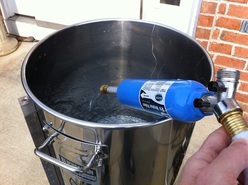
Once all grain brewers have a baseline for their water, they face other challenges that extract brewers don't. The biggest of which is being familiar with the water's mineral content to achieve the proper pH in the mash. There are other considerations as well, like using chemicals to establish a water profile to brew a perfect clone of your favorite beer!
Although a free water report can sometimes be requested from your local water authority, the best way to be sure of your water's content is to use a private company like Ward Laboratories. This is especially true if you are on well & septic. [Read More]
